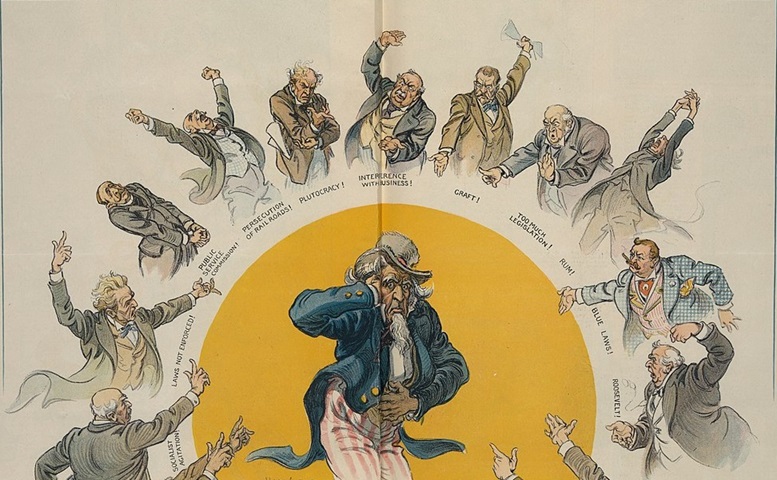.
The Untimely Demise
of My Dear Uncle Sam
I received the somber news
__as sun set low today.
My beloved Uncle Sam
__by death was swept away.
It wasn’t on the battlefield that
__he met his demise.
‘Twas long before when men ignored
__the counsel of the wise.
Through hazy blue and smoky gray
__the soldiers made their case.
With bayonets each man fought for
__the cause his heart embraced.
Surely some were justified
__in what they thought was right.
Others fell as Justice found
__their motives dark as night.
Languish we in mourning
__as the distant fiddles play,
For my beloved Uncle Sam
__has left and gone away.
Foreboding fears meet bitter tears
__as distant fiddles play,
For my beloved Uncle Sam
__has left and gone away.
.
.
All Things New
He cannot hurt you now, my love,
__can’t hurt you anymore.
He cannot reach beyond the chasm
__nor step foot through yonder door.
Blood was spilt and wounds inflicted.
__Bruises I can see on you.
In your eyes, your countenance,
__I see the pain he put you through.
Come, sit with me. Come, sit, and rest.
__I’ll dry your anguished tears.
I’ll hold you tight within my arms,
__and calm your deepest fears.
I will not leave your side, my love.
__Your soul, it longs for peace.
I will not leave you all alone
__in sorrow, torment, grief.
And one day, love, when least you think,
__your darkness will give way
to light and hope and all things good.
__You’ll see a brand new day!
This pain, though it is heavy, dear,
__Will all be over soon.
A brand new dawn is coming when
__All things will be made new.
.
.
Susan Steele Rives is a bookkeeper by profession. She has a bachelor’s degree in elementary education and a master’s degree in Christian education. She resides in the Ozark Mountain region of Missouri. She published her first poetry book, Dandelion: An Ozark Mountain Reflection, in 2024.















Love these two poems! The imagery is vivid & makes me feel like I am right there. Well done!
Jennie,
Thank you! I appreciate your kind words, and I’m so thankful for your feedback.
Susan
Come to think of it, I have not seen Uncle Sam lately in posters, or on the Internet. The kindness of generations past was once reflected by Uncle Sam, an image we thought was indeed wise and protecting. “All Things New” is a beautiful poem of the vicissitudes of present living resolved peacefully in the afterlife when we are made new.
Roy,
Thank you so much for sharing your thoughts. I truly miss that kinder, gentler era of days gone by. I am also looking forward with great anticipation to the day when all things will be made new.
Both poems effectively employ minimalist imagery to make large statements indirectly. This is a technique that creates a simple, endearing tone allowing the reader to feel emotion without giving words to its causes. A skill difficult to master, but you do so here, Susan, in what is called “common meter” (alternating iambic lines of tetrameter and trimeter). “Uncle Sam” laments loss of political ideals in American history, with recognizable reasons set forth in a symbolic or abstract manner, while “All Things New” expresses love, consolation, and hope in Biblical fashion without explicitly quoting Scripture.
The two poems are charming to read. Stanza 2 of “All Things New” sets aside the alternation of meter in favor of four tetrameter lines, an artistic choice that allows emphasis on the “I see” statements in lines 6 and 8. This is most suitable.
There are a few tiny issues of presentation elsewhere. Line 4 of “All Things New” should probably omit the word “foot” as it is unnecessary for the meaning, and doesn’t fit the meter. In “Uncle Sam,” the word “that” should be moved from line 5 to line 6, and “as” should move from line 18 back to line 17.
I very much like the repetition of “the distant fiddles play” as a sort of refrain giving old-fashioned country musical closure to “Uncle Sam.”
Margaret,
Thank you so much for your thoughtful and detailed response. I truly appreciate your kind words. I use this style of writing frequently, realizing that it differs greatly from much of the other poetry here. Because I am still mastering the finer points of meter, I’m especially thankful for your comments on the more technical aspects of the two poems. Your explanations are very helpful.
You noticed the change in meter in All Things New. I have not hesitated to include little change-ups such as that when I felt they were warranted, even though it breaks form. I’m glad you felt it was appropriate here. I will take a closer look at the presentation concerns you had as well.
I had not intended the fiddles at the end of the poem to represent a homespun countryside closure, but that interpretation also fits within the theme of the poem.
Again, thank you. I am grateful for the depth of this critique and the time you spent preparing it.
Susan